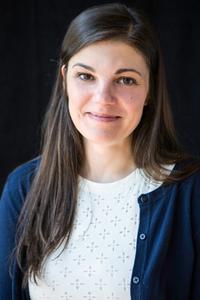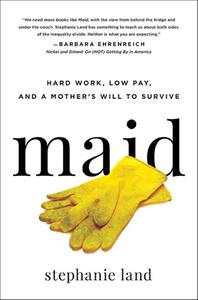
|
|
| photo: Nicol Biesek | |
As a domestic worker and single mother, Stephanie Land survived day by day, paycheck to paycheck, often judged or just unseen by the people around her. In her memoir, Maid: Hard Work, Low Pay, and a Mother's Will to Survive (Hachette, $27; reviewed below), Land shines a light on the experience of escaping domestic violence and providing for her daughter, all while following her dream of becoming a writer.
The first line in this book is so powerful: "My daughter learned to walk in a homeless shelter." Your relationship with your daughter is at the heart of this book. How has motherhood impacted your writing, and how has being a writer impacted you as a parent?
I think the writer in me clashes with my responsibilities as a parent quite a bit. I get so lost in myself, in books, in journals, in things I want to write, and parenting interrupts that almost constantly. I think parenting made me a very fast, very focused and very productive writer. I had to learn how to write 12-page essays on Shakespeare with Sponge Bob Square Pants blaring in the background when I was in college, and that carried over to when I also had to write articles as a freelancer.
The issue of the invisibility of domestic workers is painfully apparent in this memoir--and you make visible some of the people who might not get to tell their own stories. What do you hope readers will gain by seeing these stories up close?
My biggest hope is to not only increase visibility, but to increase compassion by making invisible populations more human. I hope for empathy toward the people who clean up after us, who hand us coffee, who hand over our kids after caring for them all day. These people are not paid anywhere near a wage they can live off of, and definitely not enough to support a family. I hope people start to realize that more.
There are evolving definitions of "home" in Maid: "Our space was a home because we loved each other in it," and "Home was a place that embraced us, a community, a knowing." What is your definition of home now?
You know, I don't really know. I think I'll always feel a bit distanced from that word as someone who is estranged completely from family. I'd like to say it's where the people you love are, but most of my closest friends are scattered around the country. I don't think of home as a physical place as much anymore. It's a wholeness you carry with you wherever you go.
 Barbara Ehrenreich's Nickel and Dimed is required reading in many schools; did you read the book in school yourself? Did you have any models for this book?
Barbara Ehrenreich's Nickel and Dimed is required reading in many schools; did you read the book in school yourself? Did you have any models for this book?
I read the book when it came out, or when the paperback came out. I was 19 or 20 and had already worked as a waitress and coffee girl and as a house cleaner for a brief stint. So at the time, it was about my life a little bit, even though I was young and didn't have any dependents and could work whenever I wanted to, not having to worry about child care or feeding people other than myself.
My models for Maid were countless breakout memoirs by female authors I've read over the years. I studied them as I grew into a writer because that was where I felt I was headed.
You've made it to Missoula, Mont., the town you set your sights on throughout the book. As you point out, it is a town made famous by many celebrated writers. How does it feel to be one of them now?
Ha! Boy, I don't know. We were at an event last night, and as I handed over cash to pay, the lady said, "Aren't you Stephanie Land, the famous writer?" and a lady behind her said "YES!!" I just kind of blushed and said, "Famous writer is an oxymoron," and moved along. Mia's friends at school call me famous, and I don't have to give my name for things like getting my card back when I open a tab or want a table, but I'm still just a girl in Carhartts with a couple of disheveled kids in tow.
You mention having a small stack of books while in the transitional housing. Do you remember what they were?
Probably the same ones that are on the shelf in my living room: The Prophet by Kahlil Gibran, The Alchemist by Paulo Coelho, Still Life with Woodpecker by Tom Robbins and My Story as Told by Water by David James Duncan.
What books are on your nightstand now?
I'm currently loving Deep Creek by Pam Houston.
You drink a lot of coffee in this book. Do you drink it while you write? What's your ideal cup of coffee?
Yes! Oh god yes. There is always a cup of coffee within reach. If you want me to be extremely specific, I like drip coffee--Ethiopian Yrgacheffee is my favorite--with a small spoon of raw sugar and some whole milk. --Katie Weed, freelance writer and reviewer

